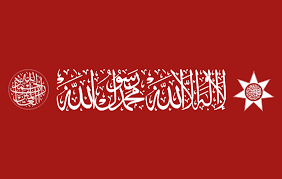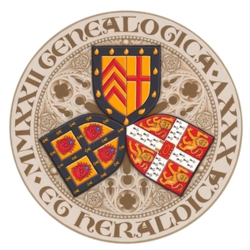
The Banū Hāshim is an Arab clan within the Quraysh tribe to which Muhammad Ibn Abdullah belonged, named after Muhammad's great-grandfather Hashim ibn Abd Manaf.
L'Académie Internationale d'Héraldique was founded in Paris in 1949 to bring together experts in heraldry representing the various areas of the world. Admission is by election, and the number of active academicians is limited to 75. There is no limit to the number of associate members.

Ludwig Adolf Friedrich, 2nd Prince zu Sayn-Wittgenstein-Berleburg-Ludwigsburg, from 1861 Prince zu Sayn-Wittgenstein-Sayn, was a Russian and German aristocrat. Among his properties were the famed Mir Castle Complex and Verkiai Palace.

Prince Dominik Hieronim Radziwiłł was a Polish-Lithuanian nobleman who was Ordynat of Nesvizh and Olyka and owner of Biržai, Dubingiai, Słuck and Kapyl estates. He took part in Napoleon's invasion of Russia in 1812 and later died of wounds after the Battle of Hanau.
Hāshim ibn ʿAbd Manāf, born ʿAmr al-ʿUlā, was the great-grandfather of the Islamic prophet Muhammad and the progenitor of the ruling Banu Hashim clan of the Quraysh tribe in Mecca. At some point in his life before his father's death, 'Amr chose for himself the name Hāshim, as it was the name God used for Abraham. The narrations from Islamic hagiographists to explain this name change are varied: A narration suggests that `Amr was called Hashim because Hashim translates as pulverizer in Arabic. As a generous man, he initiated the practice of providing crumbled bread in broth that was later adapted for the pilgrims to the Ka'aba in Mecca. Another narration claims the name derives from the Arabic root Hashm, to save the starving, because he arranged for the feeding of the people of Mecca during a seasonal famine, and he thus came to be known as "the man who fed the starved".

The Royal Heraldry Society of Canada is a Canadian organization that promotes interest in heraldry in Canada. It was founded in 1966 and granted royal patronage in 2002.

The Royal Banner of the Royal Arms of Scotland, also known as the Royal Banner of Scotland, or more commonly the Lion Rampant of Scotland, and historically as the Royal Standard of Scotland, or Banner of the King of Scots, is the royal banner of Scotland, and historically, the royal standard of the Kingdom of Scotland. Used historically by the Scottish monarchs, the banner differs from Scotland's national flag, the Saltire, in that its official use is restricted by an Act of the Parliament of Scotland to only a few Great Officers of State who officially represent the Monarchy in Scotland. It is also used in an official capacity at royal residences in Scotland when the Head of State is not present.

D'Arcy Jonathan Dacre Boulton is a Canadian medieval historian, and heraldic author and artist.
Cathy Lynne Bursey-Sabourin is a Canadian designer and heraldic artist.

Frederick Gordon Brownell was a South African herald, vexillologist, and genealogist.
Paul Langheinrich (1895–1979) was a German genealogist who saved a large number of German records that might have otherwise been destroyed from 1945 to 1953. His records were the base of the German Records Collection of the Family History Library as well as the main initial component of the Deutsche Zentralstelle fur Genealogie.
A heraldic authority is defined as an office or institution which has been established by a reigning monarch or a government to deal with heraldry in the country concerned. It does not include private societies or enterprises which design and/or register coats of arms. Over the centuries, many countries have established heraldic authorities, and several still flourish today.

The Academia Mexicana de Genealogía y Heráldica is a cultural institution based in Mexico City, Mexico.

Claude de Lannoy (1578–1643), Comte de la Motterie, was a Flemish nobleman, Governor of Maastricht and Namur and a Knight of the Order of the Golden Fleece.
Qusai ibn Kilab ibn Murrah, also spelled Qusayy, Kusayy, Kusai, or Cossai, born Zayd, was an Ishmaelite descendant of Abraham. Orphaned early on, he would rise to become chief of Mecca, and leader of the Quraysh tribe. He is best known for being an ancestor of the Islamic prophet Muhammad as well as the third and the fourth Rashidun caliphs, Uthman and Ali, and the later Umayyad, Abbasid, and Fatimid caliphs along with several of the most prominent Hashemite dynasties in the orient.
Anthony Wood, FSHA, FSSI was a British heraldic artist and a master of heraldry.
For the purposes of this article, heraldry societies are defined as private associations of people who are interested in heraldry. Heraldic authorities, which have been established by reigning monarchs or governments, are dealt with in a separate article.

The International Commission for Orders of Chivalry is a privately run, privately funded organisation composed of scholars on chivalric matters and systems of awards. Founded in 1960, its stated purpose is to examine orders of chivalry to determine their legitimacy. Its president since 1999 is Pier Felice degli Uberti, and its seat is situated in Milan, Italy.
Assumed arms, in heraldry, are arms which have simply been adopted by the armiger rather than granted by an authority.

The coat of arms of the University of Notre Dame is the assumed heraldic achievement of the University of Notre Dame. It was designed by noted American heraldist Pierre de Chaignon la Rose in 1931.











